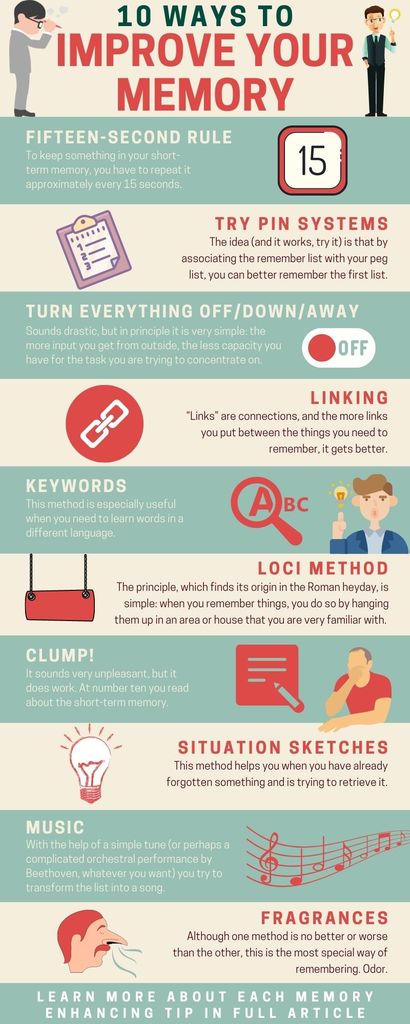Some things just won't stick; you can't remember them. Everyone sometimes forgets something, but sometimes it is important to remember certain things, and including some of the mentioned habits can help you out.
The list contains ten tips that give your memory an extra boost. They are small tricks, habits in your everyday behavior, and tiny changes in your life pattern that can make a big difference.
However, everyone has a trick that works better or less well, so it's a bit of searching and trying. Before getting on to the tips, let's understand some facts about forgetfulness and memory enhancement.
What is Forgetfulness?
Memory is the function of the brain that stores information to use later. Skills such as reading, writing, calculating, and logical thinking are impossible without memory.
Without memory, even speaking, observing, understanding, thinking, and planning would not be possible.
With memory complaints, people experience, rightly or wrongly, a deterioration of memory, a reduction in the ability to store information and/or retrieve it later.
Symptoms of Forgetfulness
Everyone sometimes forgets something. Moreover, there is a big difference in memory capacity between people; one is better at remembering information than the other.
Only when you notice that you forget more than is usual for you, there are memory complaints and possibly a memory decline. With memory problems, you can think of:
In the event of severe memory complaints, this will hamper daily activities.
If you struggle with learning in general, the video below explores 10 of the most potent mind tricks you can use to learn anything fast. With just a few simple tweaks to your learning approach, you can pick up new skills in no time.
How Does Forgetfulness Arise?
Memory is located in the brain. There are many areas involved, each with its own function. Memory is usually divided into three parts: sensory memory, short-term memory, and long-term memory.
Sensory memory
Information comes in through sensory memory, primarily through the ears and eyes.
After a few seconds, the information disappears from this memory. Part of it moves on to the next phase, the short-term memory.
Short-term memory
Important factors that influence short-term memory are:
- clarity (how awake you are)
- selective attention (what do you pay attention to)
- emotion and interest (your motivation) and understanding
In short-term memory, a limited amount of information can be kept temporarily (up to a few minutes) in consciousness.
Due to the limited capacity, information can disappear from this memory because new or old information is added.
If information in the short-term memory is processed in a certain way (for example, through repetition, ordering, or linking to old information), it can end up in the long-term memory.
Long-term memory
This memory is a permanent memory storage with almost unlimited capacity. If you want to recall a reminder, it must come from long-term memory.
Using the Learning Retention Pyramid as your guide, use the most effective way of retaining information.
Is It Serious, and What Can You Expect?
Whether memory problems are serious depends on the degree of forgetfulness and the limitations they entail in daily life. Old-age forgetfulness can be annoying, but it is not a concern.
If other restrictions are added and you are less able to take care of yourself, the condition is more severe and the memory problems may be a precursor to dementia. But if you are aware of the memory problems and suffer from them, dementia is not usually the case.

What Can You Do About It Yourself?
This decline can go faster when memory goes backward, and you make a few new impressions. This can happen, for example, due to loneliness and the lack of different social contacts.
The first thing you can do is get your memory assessed through various memory tests. This will give you insight into your cognitive function.
It is also important to have (family) contacts, stay active in social life, and have pleasant activities. That way, you help the mind stay fit.
If you're fond of playing games to improve your life (and your recall and memory), check out these blog posts:
- 11 Fun Memory Games for Kids
- 11 Best Memory Test Websites & Apps
- 11 Memory Games for Adults to Train Your Brain
Take a few tips from this list and try them out! Who knows, it helps your memory.
Things To Do to Improve Memory: A Countdown
10. Fifteen-second rule
Scientists have been researching our memory for years, and most people agree that people have short-term and long-term memory. However, the short-term memory is very short.
Of course, it varies per person, but roughly 18 seconds is about how long most people can remember a problematic combination of words or letters. Take a telephone number, for example.
Your short-term memory remembers this grab-em-bite for 18 seconds, and if it has not yet been moved to your long-term memory (and this is not that easy to do), then the number is lost.
It is, therefore, important to write it down within those 18 seconds. But yes, who always has a pen and paper within reach? The fifteen-second rule helps here, and is very simple.
To keep something in your short-term memory, repeat it approximately every 15 seconds.
You do this until you have found a piece of paper and borrowed a pen—or, in modern times, until you have dug your smartphone out of your bag and opened your note app.
9. Pin systems
Officially, it is called Mnemonic Peg System in English. It is a bizarre system for laymen, but people trained in it swear by it. How does it work?
As a peggist, you learn a standard list by heart. It can be a random list, as long as you remember it (so you need a little bit of memory to use this system!). Suppose you take 1 = gun, 2 = zoo, 3 = a hive.
We'll stick to three, but of course, you can make a much longer list—as long as you remember the list! Well done. Now comes the memory task. You have to remember three things: say “messages.”
You must have eggs, butter, and toilet paper because who wants to be without toilet paper? The trick of Peggen is to combine your original peg list with the new one. So:
- Gun and eggs. Simple, you imagine what it would look like if you loaded a gun with eggs. A funny image, and the stranger, the better it is to remember!
- Zoo and butter. Perhaps some animals would like a lick of butter?
- Beehive and toilet paper. If you distort the cardboard rolls a bit, you could use it to build a nice bee-comb, wouldn't you?
The idea (and it works; try it) is that you can better remember the first list by associating the remember list with your peg list. After all, you have associated it or linked it to the peg list. Of course, you first have to remember your peg list …
8. Turn everything off/down/away
It sounds drastic, but in principle, it is straightforward: the more input you get from outside, the less capacity you have for the task you are trying to concentrate on. Your brain can only do a certain amount of work at a time.
They would like to focus all their concentration on your one reminder task, but if other sensory data comes in (sound, smell, taste, you name it) then your brain must also pay attention to it. Putting your music down or running quiet classical music is not an alternative.

Although your brain may pay less attention to it, it will sacrifice a small part of your mind to perceive the sounds. And that ability depends on your capacity to remember. So, TV off, radio off, a hamster in the cage, and preferably also Facebook on, do not disturb!
7. Linking
“Links” are connections, and the more links you put between the things you need to remember, it gets better. What works best is to come up with a story that ties everything together.
Do you remember the three messages from memory aid number 9 (if not: eggs, butter, and toilet paper)?
For example, links between these things could go as follows: “There was once an egg from a man who smeared butter on his Toilet paper because he thought it would make it feel softer on his seat.” Admit it, you would remember such a story, right?
A problem with this method is that it is not particularly well suited for longer lists. It then becomes absurdly challenging to put everything in one story, and if you have to invent several stories, you risk forgetting one of these stories completely… For short lists, however, this is an excellent (and funny) way of to remember!
6. Keywords
This method is especially useful when learning words in a different language. It works as follows: write down the foreign word (or say it aloud).
Now, try to find an English word that is very similar in terms of sound or spelling.
Next, you will ‘associate' this English word with the meaning of the foreign word. In this way you remember what the definition of a word is much easier than if you tried to stomp it brutally into it.
For example, we take the word ‘brain' when we talk about memory. Suppose I live in the Netherlands, so I had to remember the Dutch word for it. Here we go:
Step 1: The Dutch word is hersenen.
Step 2: An English word that is very similar to this is Hershey (a park in Pennsylvania).
Step 3: The connection is easy to make; Hershey is a park where we can spend peaceful time and relax our brain.
Step 4: I won't forget that hersenen means brain!
5. Loci method
An age-old method is called the Roman Chamber method or the travel method. The principle, which originates in the Roman heyday, is simple: when you remember things, you do so by hanging them up in an area or house that you are very familiar with.
For example the house where you grew up. The memory of your grandmother, you put it in the wardrobe, you put your groceries (a recurring phenomenon) in the mailbox, and so on.
It is one of the oldest methods and especially suitable for more elaborate memories, such as anecdotes, stories, and perhaps whole persons or groups. It is less useful if you only have to remember a word list, but we have already discussed quite a few alternatives for that!
4. Clump!
It sounds very unpleasant, but it does work. At number ten, you read about short-term memory.
Apart from being very short-term (only 18 seconds), it is also very limited in capacity. It can remember between 5 and 9 ‘chunks'. A lump can be anything: a word, a number, another unit. Your memory must see it as one piece.
A word that we recognize, such as butter, is one lump. However, if we do not know the word, for example, the letter group ‘urgniko‘, then we cannot remember it as a piece. We must remember this as seven fragments; each letter is one fragment.
We can only remember and process 5 to 9 debris at a time. The art is, therefore, to clump. The idea is precisely what we saw with the word “butter.”
Because we recognize the word as a whole, it is one piece. If you have to remember the number sequence 4769155, you can do that in seven fragments; each digit is a fragment. You can also clump up numbers.
Suppose you used to live at number 47. Then you remember this as a piece. Your grandmother may have just turned 96, and your side job gives you 155 a week (if only so!). Instead of 7 fragments, you only have to remember 3, which means room for more!
3. Situation sketches
This method helps you when you have forgotten something and are trying to retrieve it. You often know it is on the tip of your tongue, but it just doesn't want to touch the conscious surface.
It can be very frustrating! What often helps is the following trick: try not to remember that specific thing but rather the entire situation. For example, suppose you want to remember which song played on a particular evening.
Try to imagine the entire evening, the entire environment, and the entire situation. Better yet, if possible, try using physical attributes. Did you drink coke? The smell and taste of cola can help your memory.
Your memory is often context-dependent. This means that certain events are stored in your memory in relation to the context (the environment).
These memories sometimes only surface if the environment is ‘correct'. Therefore, you must ensure that your environment is correct in order to remember the precise memory!
2. Music
Number 8 warned you that any distraction hinders your memory. That's true. But music can also sometimes support your memory if you actively use it. It is especially useful when you want to remember monotonous lists.
You try to transform the list into a song with the help of a simple tune (or perhaps a complicated orchestral performance by Beethoven, whatever you want).
Songs and tunes are often better absorbed by our memory than boring lists. As an example, the German words “mit, nach, bei, zeit, von, zu and aus” do something with the conjugation of articles “der, die en das“.
I no longer know exactly what, but I still know the list exactly, even though I had to learn it more than 10 years ago. That is because I sang it for myself to the melody of Father Jacob.
1. Fragrances
Although one method is no better or worse, this is the most special way of remembering. Odor.
Our sense organs work more on our unconscious than on our conscious, and thus they can be a very good assistant in retrieving memories that wander around on the unconscious level.
Are you studying for an exam? Then use the same perfume during learning as during your exam. Your brain will be able to better recall the memories of your learning session from your memory.
After all, the smell of then is linked to the smell of during the exam. Hop, memories come to mind. And if not, at least your fellow students will not smell your sweat so badly…
Final Thoughts on How to Improve Your Memory
An important final note is the following: although these are great (fun) methods of remembering things, the guarantee is right to the door. No matter how hard you try, some things are just really forgotten, and some lists are just too long to remember in one evening.
The most important trick is not one of the above but practice. The more you practice remembering, especially with the above methods, the better you get at it. So don't give up too soon!
And if you're looking for other ways to improve your memory, check out these blog posts:
- 11 Fun Memory Games for Kids
- 6 Habits to Fix and Reduce Brain Fog
- 11 Memory Games for Adults to Train Your Brain
- 15 Best Songs About Memories & Remembering Good Times
ABOUT THE AUTHOR:
Matthew Swayne is a cognitive expert, taking workshops and writing since last 8 years on memory enhancement, cognition, brain health, and stress related issues on his blog and online.



